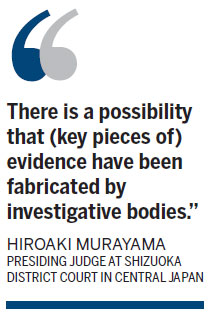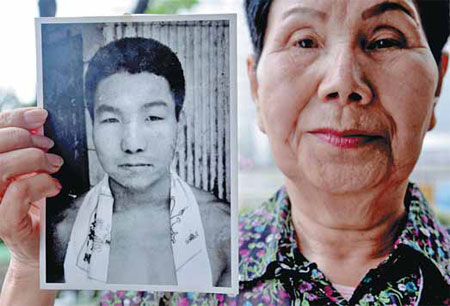Prisoner to get retrial after 47 years
A man believed to be the world's longest-held death row inmate was granted a retrial on Thursday after decades in solitary confinement, in a rare about-face for Japan's rigid justice system.
Shizuoka District Court in central Japan ordered a new trial for Iwao Hakamada, 78, over the grisly 1966 murder of his boss and the man's family.
Presiding judge Hiroaki Murayama said he was concerned that investigators could have planted evidence to win a conviction as they sought to bring closure to a crime that shocked the country.
"There is a possibility that (key pieces of) evidence have been fabricated by investigative bodies," Murayama said in his ruling, which was reported by Jiji Press.
Shizuoka prosecutors, who have three days to appeal the decision, told Japanese media that the court's decision was "unexpected".
Japan and the United States are the only two G7 industrialized nations to maintain capital punishment. The death penalty has overwhelming support among ordinary Japanese.
Hakamada is the sixth person since the end of World War II to receive a retrial after a confirmed death sentence, and his case is expected to bolster opponents of capital punishment.
Of the past five former death row inmates who received retrials in Japan, four were subsequently cleared. Higher courts threw out a retrial motion for the fifth prisoner, although his lawyers have appealed.
Hakamada initially denied accusations that he robbed and killed his boss, along with the boss's wife and their two children, before setting their house ablaze.
But the former boxer, who worked for a bean paste maker, later confessed following what he subsequently claimed was a brutal police interrogation that included beatings.
He retracted his confession, but to no avail, and the country's top court confirmed his death sentence in 1980.
Prosecutors and courts used bloodstained clothes that emerged a year after the crime as key evidence to convict Hakamada.
The clothes did not fit him, his supporters said. The blood stains also appeared too fresh for supposedly being discovered a year after the crime, skeptics said. Later DNA tests found no link between Hakamada and the bloodstained clothes, supporters said.
The now-frail Hakamada has nevertheless remained in solitary confinement on death row.
His supporters and some lawyers, including the Japan Federation of Bar Associations, have loudly voiced doubts about the evidence, the police investigations and the judicial logic that led to the conviction.

Even one of the judges on the panel that originally sentenced Hakamada to death in 1968 said he was never convinced of the man's guilt but could not sway his judicial colleagues, who outvoted him.
Japan has a conviction rate of around 99 percent, and claims of heavy-handed police interrogations persist under a long-held belief that a confession is the gold standard of guilt.
Hakamada's sister Hideko, 81, who has passionately campaigned for a retrial for decades, thanked dozens of supporters who gathered in front of the courthouse.
"I want to free him as soon as possible," she told a news conference held shortly after the court announced its decision.
"I want to tell him, 'You did well. You will finally be free,'" she said.
Hakamada seems to have developed psychological illnesses after decades in solitary confinement, Hideko told AFP in an interview last year.
"What I am worried about most is Iwao's health. If you put someone in jail for 47 years, it's too much to expect them to stay sane," the sister said.
AFP - Reuters
|
Hideko Hakamada, sister of former boxer Iwao Hakamada, who has been on death row in Japan for 47 years, holds a picture of her brother during an interview outside the Tokyo Detention House in May. Kazuhiro Nogi / Agence France-Presse |
(China Daily 03/28/2014 page10)









